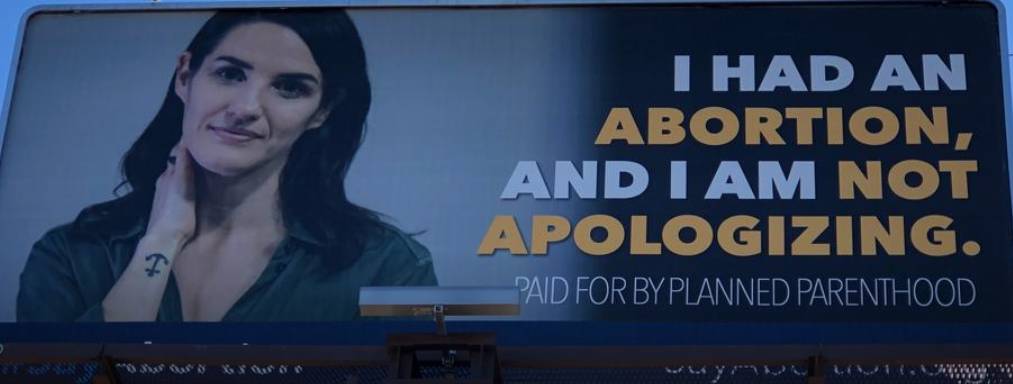
DES MOINES, Iowa — Planned Parenthood of the Heartland has announced that it has launched a billboard campaign in an effort to put faces to women who have had an abortion and aren’t sorry for it.
“I had an abortion, and I am not ashamed,” “I had an abortion, and I am not apologizing for it” and “I had an abortion, and it was just health care” the billboards read, and feature the faces of three women who ended the life of their unborn child.
The campaign is called #SayAbortion, and is meant to counter a bill that was passed last year that would ban abortion whenever a heartbeat is detected. The legislation has yet to be enacted as it is under injunction due to a lawsuit from Planned Parenthood.
“Planned Parenthood envisions a culture where abortion access is understood as a basic human right, an essential part of healthcare and a normal part of life,” Jill Meadows, the medical director for Planned Parenthood of the Heartland, said in a statement.
“Abortion is incredibly common, yet too often people who have abortions are made to feel like they can’t talk about it, or when they do speak up their stories and voices drowned out by the politics,” she remarked. “With the #SayAbortion campaign, we are putting a stop to the extreme anti-choice interest groups speaking over our patients.”
Planned Parenthood additionally outlines in its press release that “#SayAbortion is rooted in the fundamental facts that access to safe, legal abortion care is central to reproductive health, and that bodily autonomy is critical to achieving full equality.”
Billboards have currently been purchased in Des Moines, with advertisements also set to be displayed in Ames, Cedar Falls, Cedar Rapids, Council Bluffs and Iowa City.
Planned Parenthood has also set up a website for its #SayAbortion campaign, which includes videos of the women talking about their views on abortion and sharing their stories as to why they chose to abort.
“I want people to be able to talk about their abortions like they talk about their colonoscopies,” said campaign participant Rachel Goss. “[It’s] not something everybody wants to do, but sometimes we have to make decisions for our bodies or our health—mental health or physical health, whatever it is—to make us full, whole human beings.”
She stated that she personally obtained an abortion because she was single, in school and making minimum wage, and that it “was just not realistic” to be a mother at the time.
“If I would have been forced to raise a baby, I know for sure I wouldn’t be a nurse,” also said interviewee Amanda Hammon. “I wouldn’t have probably any of the kids that I have now. I probably wouldn’t have experienced the real joys of motherhood that are there. I probably would have been overwhelmed [and] stressed. … I look at my children now, and think I wouldn’t have any of them had I made a different decision.”
As previously reported, in the 1992 ruling of Planned Parenthood v. Casey, Supreme Court Justice Sandra Day O’Connor, a Reagan appointee, opined in support of the availability of abortion, “The ability of women to participate equally in the economic and social life of the nation has been facilitated by their ability to control their reproductive lives.”
However, others note that a woman’s choice is made when she willingly chooses to engage in reproductive activity, and after a life is created from that decision, it is too late to undo the choice.
“[D]on’t forget that in 99% of all abortions, the woman having the abortion chose to have sexual intercourse. Therefore, it could just as easily be argued that these women already made their choice when they chose to engage in behavior that often leads to pregnancy,” writes the site AbortionFacts.com.
“Men and women are free to choose to abstain from sex or to use birth control or to do neither. But when a woman is pregnant, the choice she has made has produced a new human being. As one woman has pointed out: ‘After a woman is pregnant, she cannot choose whether or not she wishes to become a mother. She already is, and since the child is already present in her womb, all that is left to her to decide is whether she will deliver her baby dead or alive.'”
“Once the baby is born, the woman is again free to choose: She can keep the child or give him up for adoption. The choice pro-lifers oppose is the choice that takes an innocent life.”
1 Thessalonians 4: 3-8 reads, “For this is the will of God, even your sanctification, that ye should abstain from fornication, that every one of you should know how to possess his vessel in sanctification and honor, not in the lust of concupiscence, even as the Gentiles which know not God. … For God hath not called us unto uncleanness, but unto holiness. He therefore that despiseth, despiseth not man, but God, who hath also given unto us His Holy Spirit.”
Jeremiah 8:12 laments, “Were they ashamed when they had committed abomination? Nay, they were not at all ashamed, neither could they blush.”
Become a Christian News Network Supporter...


